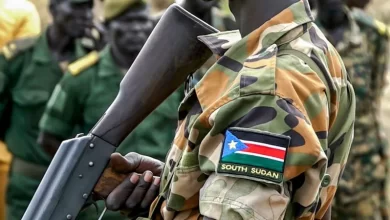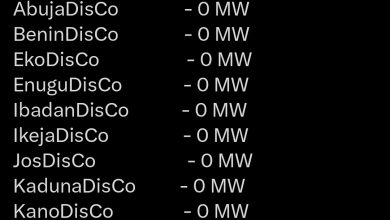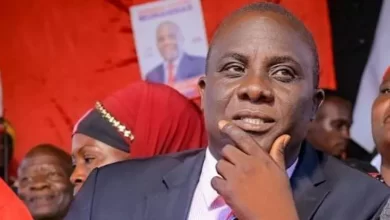Court throws out Nnamdi Kanu’s preliminary objection, proceeds with judgement on terrorism charges
.. Orders Security Operatives to eject him from Court for unruly behavior

The Federal High Court in Abuja has thrown out the preliminary objection filed by IPOB leader, Nnamdi Kanu against his terrorism trial, clearing the way to give judgement on the merit of the charges against him.
Delivering judgement on Thursday, the trial judge
James Omotosho ruled that all the grounds on which he anchored the objection were baseless.
Kanu, who took over his defence after sacking his team of senior lawyers last month, had argued that denial of fair hearing, being charged on repealed law, and his extraordinary rendition from Kenya in June 2021 invalidated his charges.
Apart from these, he maintained that he was also not medically fit to stand trial.
But the judge dismissed all the arguments of Kanu, who is facing terrorism charges for his violence-inciting campaign for the independence of Biafra.
On the argument of denial of fair hearing, Justice Omotosho said “This Court had been extremely patient and lenient with the defendant” to put in his defence but refused to do so.
He said the Court could only offer an opportunity to defendants to put their defence, “Failure to use the opportunity to defend himself will be entirely his fault.”
The Judge expressed surprise that Kanu deliberately delayed his trial, an attitude that was ordinarily common with the prosecution.
On the issue of “extraordinary rendition”, the judge ruled that Kanu’s argument was pointless as he failed to call witnesses to support the claim as required.
Justice Omotosho who cited a line of judicial authorities to back his stance, said the issue of extradition is quasi-criminal in nature, and therefore requires the parties to call witnesses to testify and be cross-examined.
He cited a Supreme Court authority that specifically ruled that “only oral evidence should be entertained in quasi-criminal proceedings” in accordance with section 135 Evidence.
“The defendant had the duty to call witnesses to testify on oath to enable the other party to cross-examine the witnesses,” the judge said.
“The law is trite in Nigeria, once a criminal element is introduced, it must be proved beyond reasonable doubt.”
With Kanu’s failure to call witnesses, Justice Omotosho ruled, the allegation “is simply an assertion without proof.”
The judge said Kanu only relied on affidavit evidence which is often used in civil matters. “The gap in evidence is that there is no evidence that was led to prove the extraordinary rendition,” Omotosho held.
Omotsho also cited the Supreme Court judgement delivered on 15 December 2023 which ordered Kanu’s trial to continue.
The judge who quoted various parts of the Supreme Court verdict held that Kanu’s illegal extraordinary rendition from Kenya, although unfair and oppressive, does not rob the trial court of its jurisdiction to try the defendant on charges for which he had been validly arraigned.
The Judge likened the stance taken by the Supreme Court to the Ker-Frisbie doctrine in the United States, which presupposes that though the act of extraordinary rendition is illegal, a trial court may assert jurisdiction to try the defendant on charges over which the court has jurisdiction. The judge cited cases in the United States where objection to trial had been dismissed applying the law
He faulted Kanu’s reliance on the Cout of Appeal’s decision given on 22 October 2022 dismissing the charges against him.
Mr. Omotosho noted that the judgement of the Court of Appeal was overturned by the Supreme Court’s judgement delivered on 15 December 2023, declaring that the illegal rendition of Kanu from Kenya did not rob the Federal High Court of its jurisdiction to try him for the alleged offences.
“The Supreme Court’s decision is final and binding on all Courts and authorities, including that of the Court of Appeal, which the defendant has erroneously relied on,” Justice Omotosho ruled.
He also noted that Kanu was awarded monetary compensation by a Kenyan Court, which declared his abduction in Kenya as a violation of his fundamental rights and awarded damages against the Kenyan government for the act. He added that Kanu cannot make the same case for the charges against him to be quashed.
He maintained that issues of fundamental rights violations or other pre-trial issues do not rob the Court of its jurisdiction to try the defendant.
Also dismissing Kanu’s argument that the charges against him were invalid because they were based on repealed Terrorism Prevention Act 2013.
The trial Judge described the argument as “interesting”.
“It is interesting because it shows the defendant’s stark misunderstanding of the law and wilful disregard of the facts cumulative in this case,” the Judge said.
He explained that the charges against Kanu remained valid as much as they were filed based on the law in existence as of the time the offences he was accused of were allegedly committed.
“As of when the extant charge was filed, the extant law in operation in Nigeria was the Terrorism Prevention Act 2013,” the judge said.
He noted that Kanu was being prosecuted for offences he allegedly committed between 2018 and 2021, while the new Terrorism Prevention Act 2022 only became operational in May 2022.
He also cited section 98 (3) of the new law which provides that any proceedings, prosecution, interest, judgements, charge or course of action pending before the new law may be enforced and continue.
He said the provision, referred to as saving provision/preservation provision, was put in place to ensure smooth transition and ensure prior proceedings were not washed away.
Earlier before delivering his judgement, the judge ordered him to be ejected from court by security operatives over his unruly behaviour, insisting that the scheduled judgement could not be delivered because he filed applications to contest it.
Kanu is facing trial on terrorism charges which accuse him of inciting violence and killings in Nigeria’s South-east to achieve the independence of the region as a sovereign Biafra state.
Following Kanu’s repeated shouts that the trial judge must show him where it was written in the law that he was not entitled to file a written address in the case against him, the Court temporarily halted its proceeding to enable security operatives to take him out of the room.






